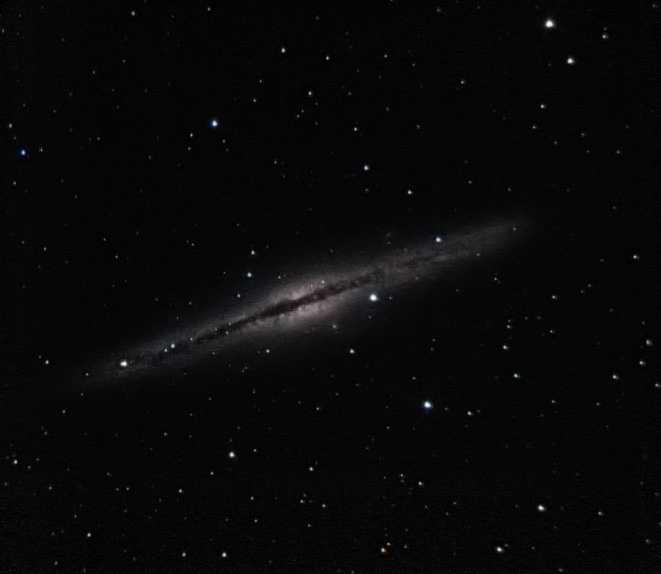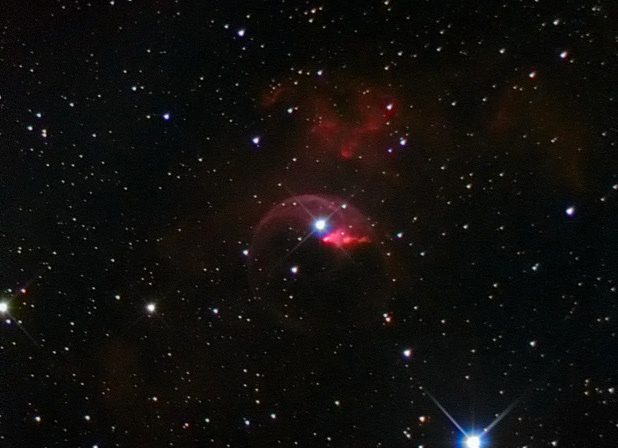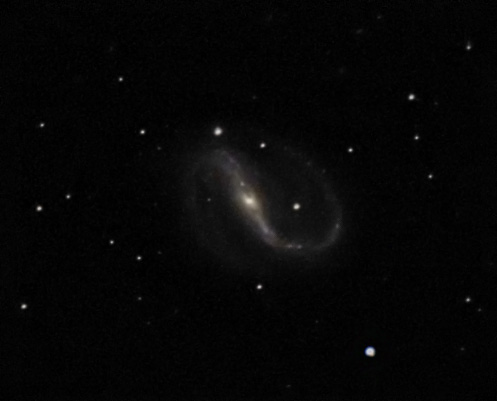NGC 2146
A Barred Spiral Galaxy.
luminance: 374 x 10 seconds (Vesta 680k)
rgb: 40 x 20 seconds (spc900nc)
Philips SPC900NC webcam - SC1
Meade Starfinder 10
Philips Vesta Pro 680k webcam - SC3 with b/w ICX424AL-E ccd
A Barred Spiral Galaxy.
luminance: 374 x 10 seconds (Vesta 680k)
rgb: 40 x 20 seconds (spc900nc)
NGC1530 is an is an archetypical barred galaxy.
The image was taken in between the clouds. I actually wanted to take more luminance and rgb shots, but I simply didn't get enough time. Apart from the lack of color data, I'm quite pleased with the final result.
Processing was done in Registax, CCDSharp, and Photoshop CS3.
Luminance: 126 x 15 seconds with the b/w Vesta Pro 680k webcam (without any filters)
RGB: 8 x 20 seconds with the spc900nc webcam (with an uv/ir-block filter)
My first 'decent' image of Saturn this season. The rings are getting very small!
There were some clouds in the sky, but I managed to shoot this image between the clouds. Seeing was average.
The image is an Ir-RGB image, where I used an infrared pass filter with my b/w Toucam Pro II 840k for luminance, and a normal RGB-webcam (SPC900NC) combined with an UV/IR-cut filter to get the color information.
In total I used about 1500 frames for Luminance and 500 frames for RGB. The image was stacked in Registax and combined and further processed in Photoshop CS3. The image has been resized to 75% to make it look a bit smoother.
An image of M 82 (aka "Cigar Galaxy")
Luminance: 172 x 10 seconds (680k, without any filters)
RGB: 17 x 10 + 16 x 20 seconds (spc900nc, in color mode using uv/ir-block filter)
Images were selected manually, stacked in Registax and further processed in Photoshop.
A new version of M76 "Little Dumbbell" planetary nebula.
L: 100 x 5 seconds (680k)
RGB: 64 x 10 seconds (spc900nc)
There were a lot of gradients in many of the frames due to some clouds and an almost full moon. I could not completely remove the gradients, so I simply chopped off a large part of the image. There also was a lot of wind when shooting the RGB frames, so the conditions were far from perfect.
Next time I'll try to shoot 10 second subs for my light frames, and 20 second subs for the colour frames.

A very nice edge on galaxy.
L: 119 x 10 seconds - Vesta 680k
RGB: 30 x 20 seconden - SPC900NC, focal reducer
All frames were manually selected. They were stacked in Registax v4 and combined and processed in Photoshop CS3.
Photo was last edited in Photoshop on November 7th, 2008

"The Bubble Nebula"
L: 146 x 10 seconds - 680k
RGB: 113 x 20 seconden - 900nc, focal reducer
All frames were manually selected. They were stacked in Registax v4 and combined and processed in Photoshop CS3.
Photo was last edited on November 7th, 2008

A spiral galaxy approximately 11 million light years away.
L: 133 x 10 seconds in prime focus without any filters (b/w 840k)
RGB: 15 x 20 seconds also in prime focus (spc900nc)
There was a lot of wind this night, so the raw frames were a bit blurry.

From left to right: Jupiter, Ganymede and Io.
L: 500 frames (840k) and 742nm Ir-pass filter
RGB: 300 frames (900nc) and UV/IR-block filter
Jupiter did not get very high at my location this year. The maximum altitude was 14 degrees above the horizon.
An animated gif of about 36 video's all processed in Registax. The images were shot between 19:30 and 21:08 (UTC).
Io is moving towards Jupiter (from right to left) and Ganymede is showing itself very briefly behind Jupiter before it enters Jupiter's shadow and disappears again!
L: 36 x 500 frames (840k) and 742nm Ir-pass filter
From left to right: Jupiter, Ganymede and Io.
L: 500 frames (840k) and 742nm Ir-pass filter
RGB: 300 frames (900nc) and UV/IR-block filter
Jupiter did not get very high at my location this year. The maximum altitude was 14 degrees above the horizon.